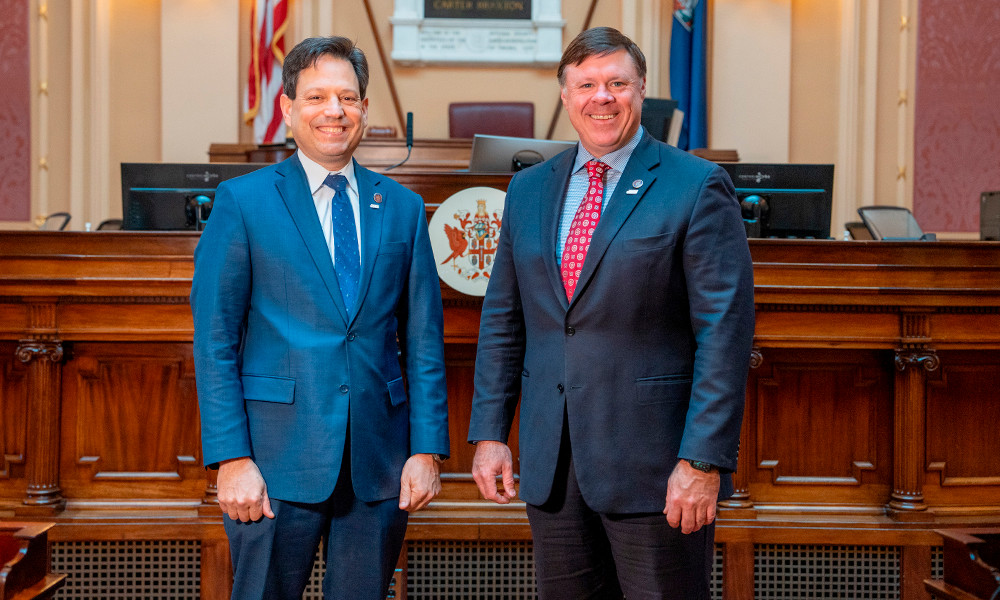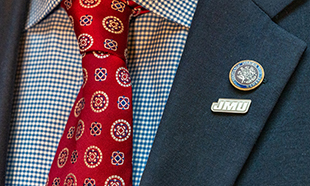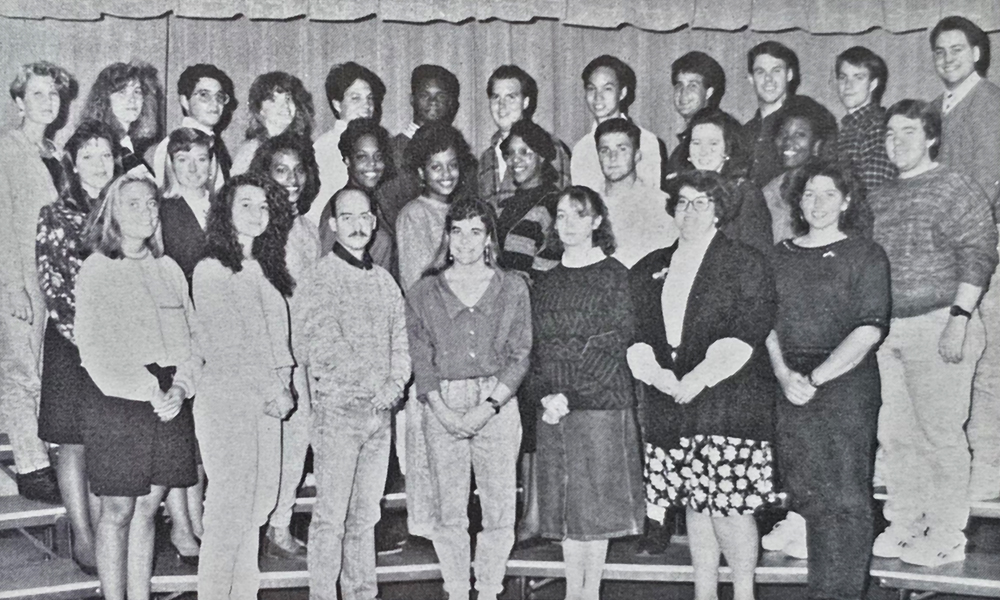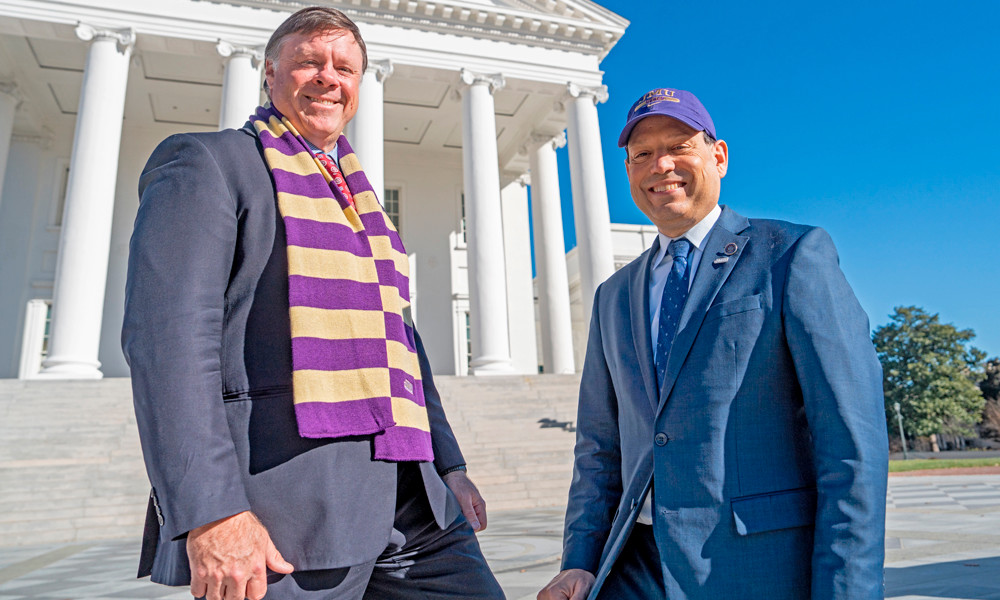Dukes classmates face off in Virginia Senate
Featured Stories
SUMMARY: Scott Surovell (D-Fairfax) and Ryan McDougle (R-Hanover) serve as majority leader and minority leader, respectively, in the Virginia Senate. Both are members of the Class of 1993. Although they will be focused on advancing their respective caucuses’ legislative agendas, they say there is room for the two parties to work together on issues affecting Virginians.
For the first time, two JMU graduates — one a Democrat and one a Republican — will lead their respective caucuses in the Virginia Senate when the General Assembly reconvenes this week.
Sen. Scott Surovell (’93), a Fairfax County attorney, was tapped by Senate Democrats to serve as majority leader after his party maintained control of the chamber in November’s statewide legislative elections. Surovell has been a member of the Senate since 2016 and previously served in the House of Delegates.
Senate Republicans, meanwhile, chose Sen. Ryan McDougle (’93), an attorney from Hanover County, as minority leader. McDougle, also a former delegate, has served in the Senate since 2006.


The two men are familiar foes, having sparred not only in the halls of the state Capitol, but also dating back to their days in student government at JMU.
“Back in college, Ryan and I, we knew each other,” Surovell said. “But I wouldn’t describe us as friends. I’m not saying we were enemies either. But we didn’t run in the same circles.”
“Scott was a Greek Row guy. I was not,” McDougle said. “He lived on campus; I lived off. Our politics were different. As a conservative, I remember having a few differences of opinion, and we butted heads a few times.”
Surovell recalled one time during his junior year when he and a group of fellow student senators convinced the Student Government Association leadership to join a group called the United States Student Association, which lobbied for the rights and interests of college students at the federal level. The membership dues were a few thousand dollars a year, Surovell said. “Ryan and some of his colleagues took offense to that. And he ended up getting some of his friends to join the Student Senate as commuter senators my senior year. And within a few months, we were no longer members.”

PHOTOGRAPH COURTESY OF THE BLUESTONE
McDougle remembers traveling to Richmond with Surovell and other student government leaders to participate in a state budget hearing. “In those days, as a citizen you would sign up to speak. Everybody would get in line and when it came your turn, you had 60 seconds or maybe two minutes to make your case [for funding]. I remember Lin Rose [then vice president of JMU] was there. He was not real keen on what I said, because I talked about fiscal responsibility and the need to keep taxes low. After I walked away from the podium, the chairman of the Senate Finance Committee quipped, ‘I bet you don’t pay taxes anyway.’ That fueled my fire for years and years.”
In 1993, Surovell ran for SGA administrative vice president. He won, drawing largely on three bases of support: the Marching Royal Dukes — of which he was a member — Greek Row and his fellow student employees at PC Dukes. “Whenever you run for office, you have to secure your bases,” he said, adding it’s especially important in low-turnout elections.
Surovell appealed to his MRD friends with a platform that included making participation in marching band count toward JMU’s physical education requirement. And, to his Greek Row mates, he tailored a proposal — later adopted by the university — to give students with a meal plan one or two guest punches per semester for when their friends visited from other schools, or for pledges to use to feed a hungry brother during pledge interviews.
During that same election, McDougle, a commuter senator, ran for legislative vice president and lost. “I got beat fairly handily,” he said. “But I learned a lot of lessons about politics that I was able to apply later. That loss at JMU resulted in my first win as a Republican Party committee chairman in my home county. Without that first defeat, I don’t know that I would have approached that race the same way.”

After JMU, Surovell and McDougle followed remarkably similar career paths — internships on Capitol Hill, law school, private practice, local party leader, election to the House of Delegates and, eventually, the Virginia Senate.
“I think we’ve both moderated some over the years,” Surovell said. “I don’t think there’s anybody in the legislature I’ve known longer than Ryan at this point. And we both care deeply about the institution of the state Senate.”
“We approach life from different directions, different viewpoints, yet we work together very closely,” McDougle said. “I think that’s a real testament to JMU.”
Although both men bleed purple, their new leadership positions in Richmond will require them to put their respective parties’ legislative agendas first.
For Surovell, that means a blue agenda during the 2024 session of increasing the minimum wage in Virginia to $15 an hour, banning sales of assault-style weapons in the Commonwealth, and protecting women’s reproductive rights.
For McDougle, it means a red agenda of tackling the fentanyl epidemic by prosecuting cases involving fatal overdoses as homicides, undoing Democrats’ attempt to hitch Virginia’s vehicle emission standards to California’s and protecting the rights of the unborn.
|
“I don’t think there’s anybody in the legislature I’ve known longer than Ryan. And we both care deeply about the institution of the state Senate.” — Scott Surovell ('93), majority leader |
|
“We approach life from different directions, different viewpoints, yet we work together very closely. I think that’s a real testament to JMU.” — Ryan McDougle (’93), |
Still, both men say there are plenty of issues on which the parties can, and should, work together for the benefit of all Virginians, including mental health resources, personal data security and learning loss from the COVID-19 pandemic.
Surovell, who as a student was encouraged by former JMU President Ronald E. Carrier to participate in Virginia’s Governor’s Fellows Program, credits him with establishing a legacy of Dukes in the halls of state government.
In addition to Surovell and McDougle, JMU graduates currently serving in elected or appointed positions in Richmond include Delegates Jay Leftwich (’85), Chris Runion (‘84M) and Atoosa Reaser (’96); Deputy Secretary of Public Safety and Homeland Security Joshua Humphries (’15, ’20M); and Attorney General Jason Miyares (’98). Additionally, former GOP Speaker of the House Kirk Cox (’86) is a Madison alumnus, as is Richmond Mayor Levar Stoney (’04), who recently announced he is running for the Democratic nomination for governor in 2025.
“Somewhere up in heaven, I think Uncle Ron is smiling down on all of us,” Surovell said.

